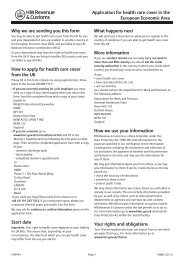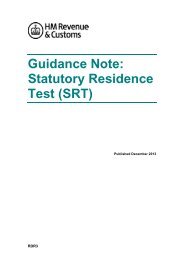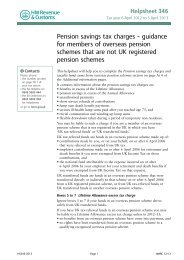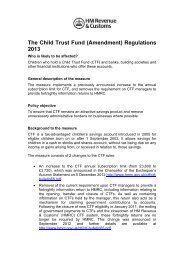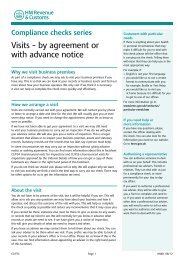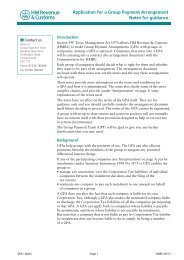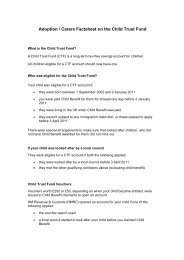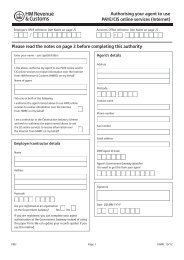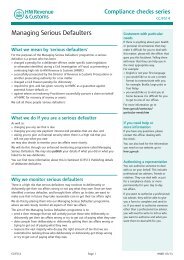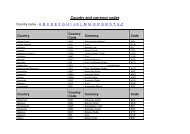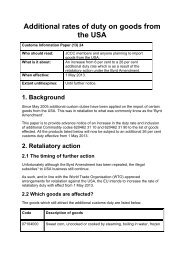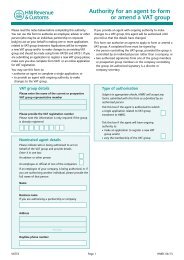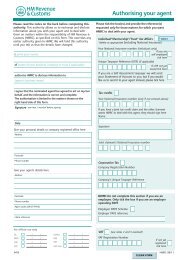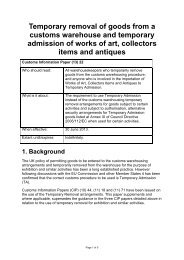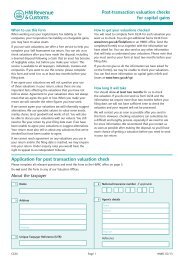DT-Company-Sweden - HM Revenue & Customs
DT-Company-Sweden - HM Revenue & Customs
DT-Company-Sweden - HM Revenue & Customs
You also want an ePaper? Increase the reach of your titles
YUMPU automatically turns print PDFs into web optimized ePapers that Google loves.
‘Where structures are within the ambit of the Indofood decision, that is to say the structure has the accessing of treaty<br />
benefits as one of its effects, it is possible that applications [to <strong>HM</strong> <strong>Revenue</strong> & <strong>Customs</strong>] for benefits under a Double<br />
Taxation Convention (<strong>DT</strong>C) will fall at the first hurdle unless the applicant can demonstrate beneficial ownership. The<br />
application might simply be regarded as invalid and never reach the stage where it can be considered in terms of the<br />
object and purpose of the particular <strong>DT</strong>C under which the application is made.<br />
However, where the claimant Special Purpose Vehicle (SPV) does not satisfy the “international fiscal meaning” of<br />
beneficial ownership but believes that it is still able to obtain treaty benefits because of the policy confirmed in this<br />
guidance, it should make its claim and include a note to that effect. To ease consideration of the claim, the note should<br />
include full details as to<br />
• A full structure diagram and explanation of the capital and interest flows;<br />
• why the SPV is considered to be the beneficial owner within the “international fiscal meaning”; or<br />
• demonstrate that the structure does not abuse the <strong>DT</strong>C under which the claim is made either relating the<br />
structure to the examples at INTM332080 or otherwise.’<br />
Where a claim/application for relief from UK tax is made by a partnership or other concern that is not a taxable person or<br />
is otherwise ‘transparent for tax purposes’ under the law of its country of residence, you should tick box 2(b) in the<br />
declaration in part F of the form and provide additional information as outlined in the <strong>HM</strong> <strong>Revenue</strong> & <strong>Customs</strong> guidance<br />
at INTM335500.<br />
‘Subject to tax’ condition<br />
If the condition for relief from UK tax in the Double Taxation Convention is not ‘beneficial ownership’ and instead it is that<br />
the income must be subject to tax in the hands of the claimant you should tick box 2(a) in the declaration in part F of the<br />
form. See the <strong>DT</strong> Digest for information about the whether the treaty has a ‘subject to tax’ condition.<br />
5. Claims on behalf of partnerships and LLCs<br />
Double Taxation Conventions (<strong>DT</strong>Cs) do not normally give the right to claim relief to partnerships and LLCs where these<br />
are tax-transparent. Instead, in those cases where the income of the concern is taxable in the hands of its partners or<br />
members (rather than at the level of the concern itself) each of those should in strictness make a separate claim to treaty<br />
relief.<br />
<strong>HM</strong> <strong>Revenue</strong> & <strong>Customs</strong> recognises that adopting this strict approach may impose an unreasonable administrative<br />
burden on claimants which is not needed in many cases to give effect to the intent and purpose of the treaty.<br />
In such cases, and without prejudice to our right to require individual claims, we will normally be prepared to accept a<br />
single (composite) claim in the name of the partnership or LLC. This must include the following features, in addition to<br />
the normal information that is required by the form <strong>DT</strong>-<strong>Company</strong>:<br />
• In all cases the general or managing partner/member should sign the declaration in Part F of form <strong>DT</strong>-<strong>Company</strong>.<br />
• Where all of the partners/members are resident for tax purposes in the same country as the one in which the<br />
partnership or LLC is established (the country with which the <strong>DT</strong>C applies), attach to the claim a list of the names and<br />
addresses of the partners/members. The list should show residential addresses for individuals and registered<br />
addresses where the partners/members are companies.<br />
• Where any partner/member is resident for tax purposes in a different country to the one in which the partnership or<br />
LLC is established, attach the list described above. The list must also include for each member/partner their<br />
respective percentage share of the income that is the subject of the claim.<br />
Any partner/member resident for tax purposes in a different country to that in which the partnership or LLC is established<br />
will also need to make a separate claim to relief from UK tax under the terms of any relevant <strong>DT</strong>C. (The <strong>DT</strong> Digest lists<br />
all of the UK’s comprehensive <strong>DT</strong>Cs.)<br />
6. Help or further information<br />
If, after using these Notes you need help or more information, please<br />
• visit our website www.hmrc.gov.uk and look for non-residents in the Search facility<br />
• or phone <strong>HM</strong> <strong>Revenue</strong> & <strong>Customs</strong> LBS <strong>DT</strong> Treaty Team<br />
+44 115 974 0897 if calling from outside the UK, or 0115 974 0897 if calling from the UK<br />
• or write to <strong>HM</strong> <strong>Revenue</strong> & <strong>Customs</strong>, LBS <strong>DT</strong> Treaty Team, Barkley House, Castle Meadow Road,<br />
Nottingham, England NG2 1BA<br />
Our fax number is +44 115 974 0666 from outside the UK, or 0115 974 0666 from the UK.<br />
Please quote the company’s or concern’s reference number with us (for example ‘7/A/123456’) whenever you contact us.



